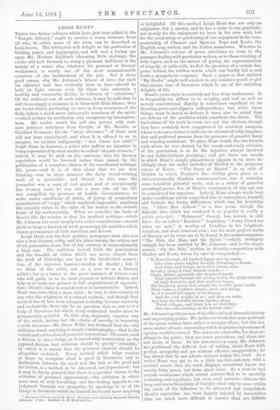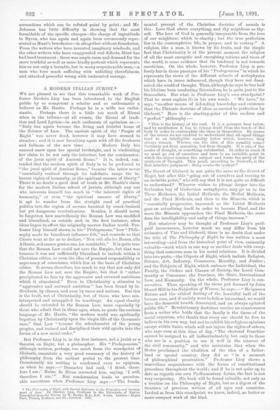LEIGH HUNT.* THESE two dainty volumes which have just been
added to the "Temple Library," ought to receive a warm welcome from all who, in either sense of the term, can be described as book-lovers. The bibliophile will delight in the perfection of binding, paper, and typography, and will cast a loving eye upon Mr. Herbert Railton's charming little etchings ; the reader will look forward to many a pleasant half-hour in the society of a writer who, whatever his personal or literary weaknesses, is surely one of the most companionable members of the brotherhood of the pen. Nor is there good reason why Mr. Johnson's labour of love—for such his editorial task has evidently been to him—should be held in light esteem even by those who entertain a healthy and reasonable dislike to volumes of "selections." Of the ordinary run of such volumes, it may be said that to call them simply a nuisance is to bless with faint blame ; they are books which, professing to save us from weariness of the flesh, induce a much more unbearable weariness of the spirit, —which irritate by mutilation, and exasperate by incomplete- ness. No reader worth his salt can peruse with com- mon patience selections from Carlyle, or Mr. Ruskin, or Cardinal Newman; for the "large utterance" of these men will not bear curtailment, and when it is offered to us in samples, we exclaim indignantly : " Aut Canar aut nihil !" Leigh Hunt is, however, a writer who suffers no injustice in being represented by what used to be called "elegant extracts ;" indeed, it may be said, on the contrary, that his literary reputation would be lowered rather than raised by the publication of a complete edition of his uncollected writings. His prose—and it is of that alone that we are now thinking—was in large measure the daily bread-winning work of a journalist ; and though in this case the journalist was a man of real genius and of exceptionally fine literary taste, he was also a man who all his life was compelled, by pressure of hostile circumstances, to write under conditions of strain, of hurry, of compulsory manufacture of "copy," which rendered impossible anything like equality either in the value of his matter or the artistic finish of his workmanship. When we consider the facts of Hunt's life, the wonder is that his inedited writings—which Mr. Johnson has most largely laid under contribution—should yield so large a harvest of work possessing the qualities which ensure permanence of both nutrition and flavour.
Leigh Hunt was the first genuine newspaper-man who was also a true literary critic, and his place among the critics, not of his generation alone, tut of his century, is unquestionably a high one. His criticism lacked both the penetration and the breadth of vision which are never absent from the work of Coleridge, nor has it the intellectual momen- tum of the vigorous hammer-strokes of Hazlitt ; but if we think of the critic, not as a seer or as a literary athlete, but as a taster at the great banquet of letters—one who will guide us to its most piquant or delicate dishes, and help us to train our palates to full exquisiteness of apprecia- tion—Hunt's claim to consideration is incontestable. Indeed, Hunt was more than a mere critic ; he was, in this country at any rate, the originator of a critical method ; and though that method has of late been eulogised foolishly, because narrowly and exclusively, there can be no question that we owe to it a body of literature for which every cultivated reader must be permanently grateful. In that airy, dogmatic, superior way of his, which, having lost the charm of novelty, is becoming a trifle tiresome—Mr. Oscar Wilde has declared that the only criticism worth anything is simple autobiography,—that is, the record and celebration of personal impressions. Of course, such a dictum is sheer fudge, as demonstrably nonsensical as the opposed dictum that criticism should be purely "scientific," by which it is meant that the personal element should be altogether excluded. Every method which helps readers at large to recognise what is good in literature, and to distinguish between the good and the bad, or the good and the better, is a method to be esteemed, not depreciated ; but it may be freely granted that there is a peculiar charm in the criticism of personal appreciation,—the criticism in which some man of wide knowledge and fine feeling appeals to our judgment through our sympathy, by speaking to us of the things in literature which lie himself has found most inspiring * Essays and Poems of Leigh Hunt, Se'eeted and edited by Reginald Driraley Johnson. 2 vole, London: J. M. Dent and 0o. or delightful. Of this method Leigh Hunt was not only an originator, but a master, and he has a claim to our gratitude, not merely for the enjoyment we have in his own work, but for the awakening or quickening of our enjoyment in the com- panionship of Chaucer and Spenser, Pope and Keats, the English song-writers, and the Italian sonneteers. Whether in Mr. Johnson's volume of prose selections we turn to the passages dealing with particular writers, or to those treating of wide topics, such as the nature of poetry, the representation of tragedy, or table-talk, we feel the presence of a certain fine. gusto behind the written words which can hardly fail to call forth a sympathetic response. Such a paper as that entitled "My Books" might well awaken in any sensitive youth or girl that intense love of literature which is one of the unfailing delights of life.
Hunt's prose style is certainly not free from weaknesses. It is frequently too diffuse to be weighty, and real as well as merely conventional dignity is sometimes sacrificed to its dressing-gown-and-slippers colloquialism ; but while these things must be noted as defects, it must also be noted they are defects of the qualities which constitute his charm. The limitations of his work in verse are not less obvious, though they have certainly been exaggerated by mistaken assayers,. whose tests serve better to indicate the absence of lofty imagina- tion and profound passion than the presence of graceful fancy and winning sentiment. To place Hunt beside the two friends, with whom he was classed by the rough-and-ready criticism of his generation, is to do the injustice always involved in any indiscriminate grouping ; and yet there are moods in which Hunt's simple pleasantness appeals to us more in- vitingly than the aerial melodies of Shelley or the gorgeous colour of Keats. "The Story of Rimini" is an echo of Dryden in which Dryden's flue virility gives place to a characteristically Huntian sentimentalism, but it contains some beautiful pictorial work ; and as a writer of graceful occasional poems, few of Hunt's countrymen of any age can be considered his superiors. Indeed, Hunt always wrote best.
under conditions which compelled him to concentrate himself, and forbade the frisky diffuseness which was his besetting sin. "Abou Ben Adhem" is a fine poem, though the- didactic idea which has rendered it so popular is really a petitio principii ; " Mahmoud," though less known, is still finer ; the so-called " Rondeau" beginning, "Jenny kissed me when we met," is worthy of Catullus in his brightest,.
daintiest, and most innocent vein ; but his most perfect works. of literary art in verse are to be found in his sonnet-sequence, "The Fish, the Man, and the Spirit "—which, strangely enough, has been omitted by Mr. Johnson—and in the single- sonnet, "On the Nile," written in friendly competition with Shelley and Keats, whom for once he vanquished :— " It flows through old hushed Egypt and its sands,
Like some grave mighty thought threading a dream, And times and things, as in that vision, seem
Keeping along it their eternal stands,—
Caves, pillars, pyramids, the shepherd bands That roamed through the young world, the glory extreme.
Of high Sesostris, and that southern beam, The laughing queen that caught the world's great hands.
Then comes a mightier silence, stern and strong, As of a world left empty of its throng, And the void weighs on us ; and then we wake, And hear the fruitful stream lapsing along
'Twixt villages, and think how NVO shall take
Our own calm journey on for human sake."
Mr. Johnson's performance of his editorial task demands hearty and ungrudging praise. We incline to think that some portions of the prose volume have rather a scrappy effect ; but this is a mere matter of taste concerning which dogmatic expressions of opinion would be absurd. The notes are admirable, for they are always to the point ; they are never gratuitous, and there are not many of them. In his introductory essay, Mr. Johnson has performed the difficult feat of writing about Hunt with perfect sympathy and yet without effusive exaggeration; he has shown that he can admire without losing his bead. As a writer Hunt was apt to be a little too free-and-easy, with a. natural result that his work displays occasional lapses not merely from grace, but from good taste. As a man he had certain weaknesses which robust natures find to be specially irritating and repellent; but even such natures—witness the long and warm friendship of Carlyle-:-had only to come within the circle of his influence to be attracted and vanquished. Hunt's reputation has been largely injured by innuendoes that are much more difficult to answer than are definite
accusations which can be refuted point by point ; and Mr. Johnson has little difficulty in showing that the most formidable of the specific charges—the charge of ingratitude to Byron, who has again and again been erroneously repre- sented as Hunt's benefactor—is altogether without foundation. From the writers who have invented imaginary misdeeds, and the other writers who have exaggerated real defects, Hunt has had hard treatment : there was ample room and demand for the more truthful as well as more kindly portrait which represents him as not only a loveable, but in many respects noble man,—a man who bore much suffering with unfailing cheerfulness, and attacked powerful wrong with undaunted courage.



































 Previous page
Previous page